June 3, 2022
Air Date: June 3, 2022
FULL SHOW
SEGMENTS
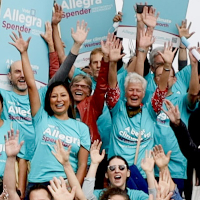
Down Under Climate Hopes Up
/ Blair PaleseView the page for this story
Australia is a leading coal and natural gas exporter and has stubbornly opposed major climate action for decades, even as climate disasters like fires, floods, and droughts have taken their toll. But now Australian voters have ushered in a more progressive Parliament in the recent elections that signals their country is heading in a new direction on climate. Blair Palese is managing editor of Climate and Capital Media and joins Host Steve Curwood to discuss. (14:04)
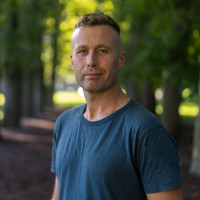
Cutting Up Credit Cards to Stop Coal
View the page for this story
The winner of the 2022 Goldman Environmental Prize for Islands and Island Nations is activist Julien Vincent, who led a grassroots campaign that convinced some of Australia's biggest banks and insurers to commit to ending backing for coal projects by 2030. He joins Host Jenni Doering to talk about the impact of targeting the fossil fuel industry’s financial support. (10:27)
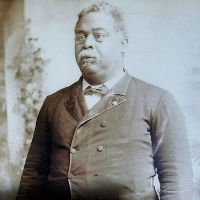
Join us for a Juneteenth Celebration!
Join Living on Earth and our partners for "Black Courage Upon the Sea: A Juneteenth Celebration of Robert Smalls" on Monday, June 20th ()

Taking the A Train to a National Park
View the page for this story
Gateway National Recreation Area offers green spaces, beaches and recreation just a quick transit ride from the urban jungle of New York City. Don Riepe is the guardian of the Jamaica Bay portion of Gateway and joins Host Steve Curwood to talk about the value of affordable and accessible venues in nature. (07:16)
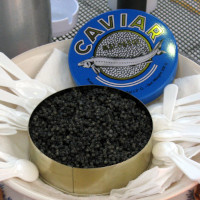
Beyond the Headlines
/ Peter DykstraView the page for this story
On this week’s trip beyond the headlines, Environmental Health News Editor Peter Dykstra and Host Jenni Doering take us all the way to the Caspian Sea, where four species of caviar-bearing sturgeon may soon receive a U.S. endangered species listing. They next take a look at the legacy of the late environmental economist Hazel Henderson, who popularized the slogan “think globally, act locally.” Finally, the two dive into the history books to consider the thirtieth anniversary of the Rio Earth Summit. (04:29)
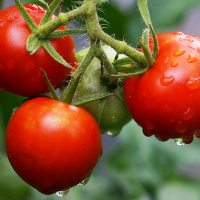
Gardening on a Budget
View the page for this story
With inflation driving up prices of many products including food, a great way to access quality produce without breaking the bank is to grow it yourself. Michael Weishan, former host of the Victory Garden on PBS, spoke with Living on Earth’s resident gardener Bobby Bascomb. (10:19)
Show Credits and Funders
Show Transcript
220603 Transcript
HOSTS: Steve Curwood, Jenni Doering
GUESTS: Blair Palese, Don Riepe, Julien Vincent, Michael Weishan
REPORTERS: Peter Dykstra
[THEME]
CURWOOD: From PRX – this is Living On Earth.
[THEME]
CURWOOD: I’m Steve Curwood.
DOERING: And I’m Jenni Doering
Australian elections usher in a more climate aware Parliament and Prime Minister.
PALESE: Albanese has a policy; he did, once elected, say we want to turn Australia into a renewable energy superpower. This is a vast improvement from where we've come. Let's start there and let's see what these teal independents and the Greens can do to push that further. And that's I guess where the hope of Australia is right now.
CURWOOD: And with inflation, we’ll have some tips for frugal gardening.
WEISHAN: The way to make a garden cost effective is very simple. Keep gardening because he starting costs are what they are, they're fixed. So if you try it and then stop. I mean essentially you do have the 65-dollar tomato but if these costs are amortized over five years, ten years, then you have the 15-cent tomato.
CURWOOD: That and more this week on Living on Earth – Stick Around!
[NEWSBREAK MUSIC: Boards Of Canada “Zoetrope” from “In A Beautiful Place Out In The Country” (Warp Records 2000)]
[THEME]
Down Under Climate Hopes Up
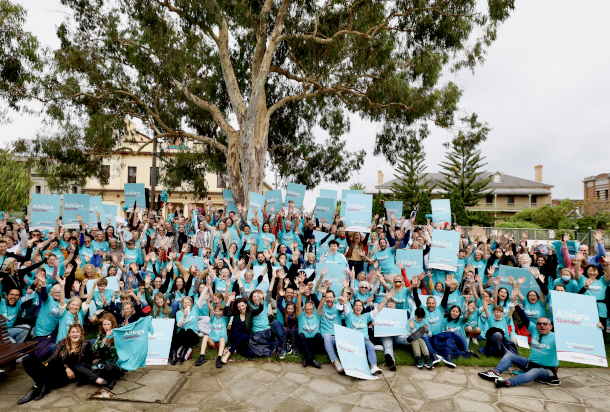
The campaign launch of “teal” independent candidate Allegra Spender, who defeated Liberal MP Dave Sharma in the 2022 elections to win a seat in the Australian Parliament. (Photo: Blair Palese, used with permission)
DOERING: From PRX and the Jennifer and Ted Stanley studios at the University of Massachusetts, Boston this is Living on Earth, I’m Jenni Doering
CURWOOD: And I’m Steve Curwood.
Australia is the world’s biggest exporter of natural gas and second biggest exporter of coal and for decades it has stubbornly opposed major climate action at home and abroad. Until now. A series of climate related fires, floods and droughts has battered Australia so much in recent years that a few weeks ago a majority of voters said enough and tossed out the climate-denying right wing Liberal-National party alliance. Bolstering the winning Labor party were Green Party voters and so-called teals. Teals are moderate candidates who blend Green party values of climate action and women’s rights with the fiscal conservatism of Australia’s blue Liberal-Nationals. Joining us from Sydney to discuss is Blair Palese managing editor of Climate & Capital Media and cofounder of 350.org Australia. Blair, welcome to Living on Earth!
PALESE: Thank you so much.
CURWOOD: So give me the skinny, what happened in this election? Why did voters seem to respond so much more enthusiastically to independents?
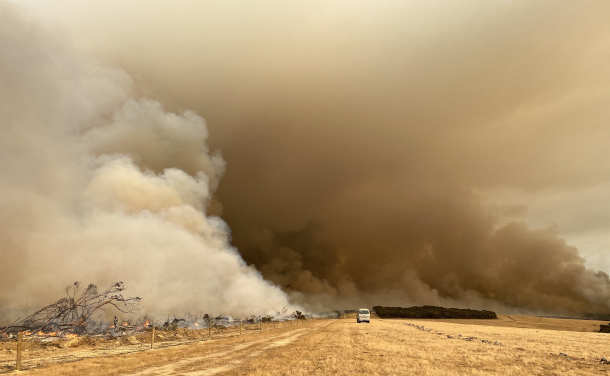
A January 2020 fire on Kangaroo Island, which lies off the southern coast of Australia. Nearly half of the island burned in the devastating 2019 - 2020 “Black Summer” fires. (Photo: robdownunder, Flickr CC BY-NC-ND 2.0)
PALESE: Yeah, it was quite a transformation of the country overnight, when we went from a very far right, conservative government that was made up of two parties really out of touch with Australia, and particularly ignoring the issue of climate change, as well as the incredible impacts of fires and floods that we've had over the last three and a half years. I think the public reaction was very much to that. But the community base of these independent candidates coming up very much out of their local electorates made a huge difference, because, you know, they were people that the community knew; they were putting forward very clear agenda about what they wanted to address, and climate change topped the list. And it was a real change for the kind of politics that have been going on here for the last decade.
CURWOOD: One of the interesting things about these "teal" independents that I've read, is that on a number of issues, they would be considered moderate, maybe even ever so slightly conservative, but really gung-ho on dealing with the environment and the rights of women and so forth. How accurate is that? And to what extent do you think a place like the United States could use independent activists along those lines?
PALESE: That's a great question. I actually think what Australia just did is a model for much of the world in that the kind of conservative parties -- in America, it would be the Republicans -- have gone to such a far right extreme, that it doesn't represent any more the kind of mainstream or middle sector of the country. That was very much the case here, that the party had taken their party way off into a far right agenda that most people could not accept, or have any kind of appreciation for. And the teal women and these independents saw the opportunity to run on what used to be kind of the old Liberal Party agenda -- that was our conservative party. And they would call themselves fiscally conservative, but socially progressive. So these women and others put forward a position that was back to that kind of old thinking of, we want a strong economy, but we want to address all the major issues. And in fact, you can't ignore the economic opportunities of climate change. And they saw that as a positive economically, as well, as you know, being supportive of women. One of the challenges of the previous far right government was women just were not being included in any way. And women's issues were not being addressed. We've had an incredible number of sexual assault cases and accusations of harassment in the government. So when these women candidates stepped up out of their community, most of them very successful professionals in their own right, and said enough is enough on the climate front, on the integrity front and on the women's front, I think there was a real resignation of that not just with women, but with men feeling like it was time for a change.
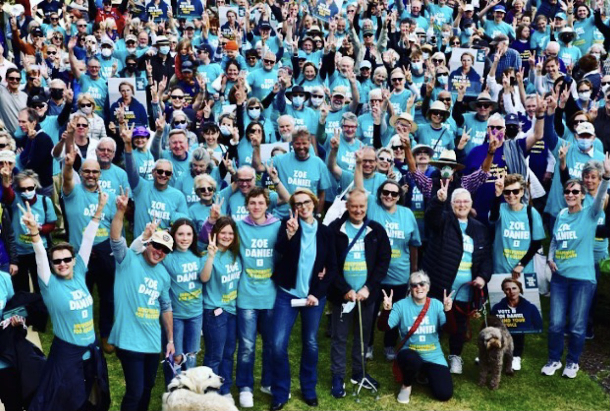
Supporters at winning “teal” candidate Zoe Daniel’s campaign launch. She unseated incumbent Liberal MP Tim Wilson in the 2022 elections. (Photo: Margo Kingston, No Fibs, used with permission)
CURWOOD: Now, Rupert Murdoch, the media mogul, by the way, has Fox in the United States, along with the Wall Street Journal and some very conservative publications in the UK. He, of course, came out of Australia, originally made his money there. To what extent did the Murdoch media empire play into the rhetoric of this campaign and the parties that lost?
PALESE: Yeah, Rupert Murdoch was 100% part of this campaign on the wrong side, on the losing side. And many commented after the election that Rupert Murdoch lost the election, as in, people refused to vote and support the Murdoch agenda, which is very much propaganda. It just isn't news as we know it. It's not independent in any way. It's not objective in any way, it comes with an agenda. Rupert Murdoch owns 85% of the media in Australia.
CURWOOD: Of the electronic media?
PALESE: Not just electronic: the Australian newspaper, The Daily Telegraph, newspapers as well, community papers; in Queensland they own 100% of the media. So the fact that voters really rejected that openly says a lot about how far it's gone, and how much people have really had enough of feeling like they're being used through this political agenda that Murdoch brings, and that the connection between the politicians and the media is a dangerous alliance that just doesn't allow for democracy.
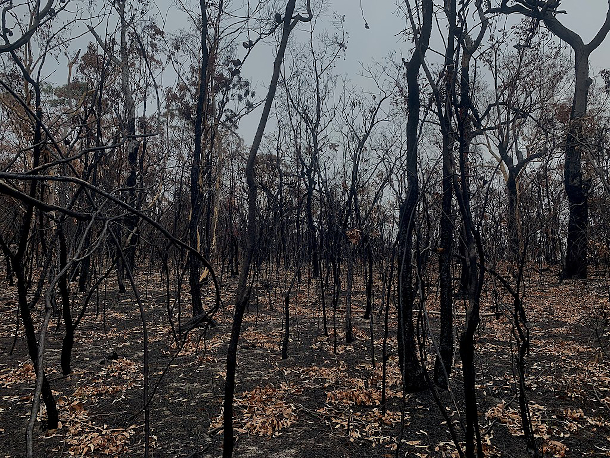
A blackened forest in Yengo National Park in New South Wales that burned during the 2019 – 2020 summer fires. (Photo: Olderthangoogle, Wikimedia Commons CC BY-SA 4.0)
CURWOOD: I remember seeing over these last year or two, some pretty horrific scenes involving drought and fire and problems. I mean, to what extent have the climate catastrophes in Australia contributed to these election results?
PALESE: Absolutely, 100%. I think, Queensland in particular, not just drought and fire but flood over the last year and a half. I mean, extreme flooding where people lost everything, images of people climbing up to their roofs to be removed by helicopter, people being swept away in their cars. There was a death toll, there was a massive impact on businesses, on communities, on houses. So you had a combination of that. And then the fires on the East Coast about two and a half years ago, two years ago, where the smoke was so heavy for so along with the actual impacts of smoke on people's health, and the death toll from that was extreme. And we didn't see any recognition of this as a problem or ownership by the government of attempting to solve the problem, whether it was through, you know, aid after the fact of these catastrophes or addressing climate change itself. So the frustration level was extremely high everywhere around the country.
CURWOOD: So tell me now, what has the new prime minister, Anthony Albanese of the Labor Party, what's he said about climate change during the campaign, and now that he's in office? How's he going to address it?
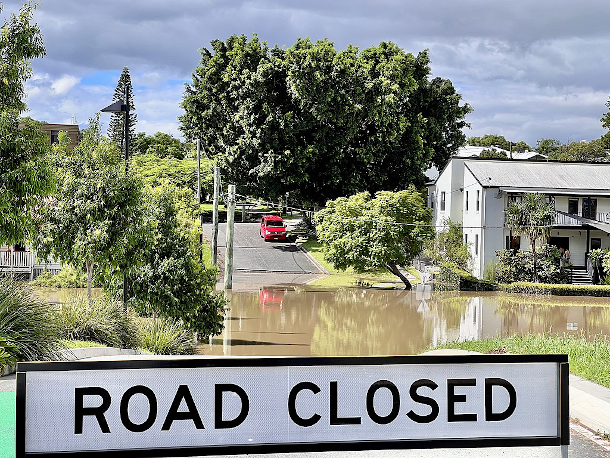
Flooding in Brisbane, the capital of Queensland, in February 2022 (Photo: Kgbo, Wikimedia Commons CC BY-SA 4.0)
PALESE: He does have a policy, his party has a policy. It's not nearly as far as it should go in terms of setting real targets for emissions reduction, really solid transition out of fossil fuel power here in Australia. And I think, you know, one of the biggest challenges for all of Australian politicians anywhere is that on the agenda, we don't have the issue of exports -- which, you mentioned liquid natural gas, and coal, we're one of the biggest exporters in the world. This isn't yet on the agenda, because under the Paris Agreement, we are not responsible for those emissions. And I feel that has to change in order for the country of origin to take responsibility. But that said, Albanese has a policy, he has some approach, ideas about how to progress things. He did, once elected, say we want to turn Australia into a renewable energy superpower. This is a vast improvement from where we've come.
CURWOOD: Well, what about coal, though? I mean, I think coal is almost totemic there in Australia, in terms of an industry, the miners, the Liberal party really supporting it. I mean, how far can Albanese go in terms of dealing with coal without running the risk of, of not being able to keep his job?
PALESE: It's a challenge, and it's certainly a challenge in those communities. But you did see a change in places like Queensland, where previously it had been very much you couldn't talk about that. And these Greens and Independents got elected -- Queensland, unbelievable, just has three Greens that have come up, it's now like the seat of Greens! So the switch over is incredible. I think the inevitability of understanding that the transition has to happen, and what we need is policy to allow it to happen and protect workers and communities. Albanese is probably the best placed to do that, because he's connected in good context with the labor union movement here, that does help. How do you broker a way forward that can help workers and communities while making that difficult transition economically? So he's probably best placed. And I'd add, with the pressure of the Greens and the independents to say, we must continue to keep climate front and center. So it's not just about how slow we go on that transition to soften the blow, but to do it effectively. And I think he can do it with that kind of pressure. And that's what we're all hoping, post the election.
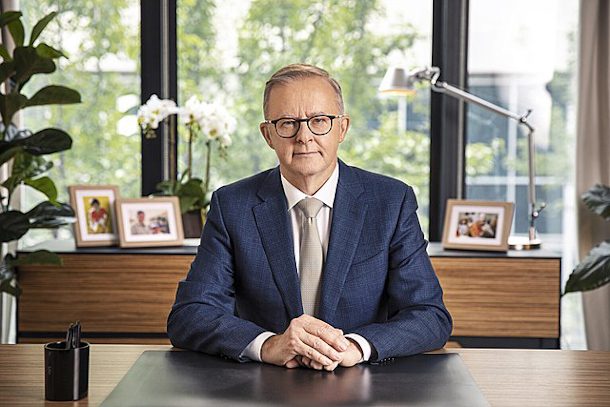
Newly elected Prime Minister Anthony Albanese has called for Australia to become a renewable energy superpower, though he also supports some continued extraction of coal. (Photo: Australian Government, Wikimedia Commons CC BY 4.0)
CURWOOD: So the fossil fuel industry, Blair, is one of the richest and most powerful entities on the planet. I'm thinking Russia, I'm thinking Saudi Arabia, I'm thinking the United States, and what's been going on in Australia for that matter. So even with the climate being so front and center in this newly elected Parliament, at the end of the day, how can your country extricate itself from that very intense and expensive, money related relationship within the coming decades?
PALESE: I'd give you an example of a mining magnate here called Andrew Forrest, his nickname is Twiggy. So everyone laughs about his nickname, "Twiggy Forrest." [LAUGHS] He, he is a mining, steel, iron ore magnate; had depended for decades and decades on fossil fuels as a big part of what he was doing in terms of energy. He now says we have to get off coal 100%, we have to do it very fast. And he's become the biggest advocate in the world for green hydrogen, as a alternative to fossil fuels and a way to continue to do all ranges of heavy industry, whether it's iron ore, or whether it's heavy industry and transport. He has a vision. It is transformational of a kind that few others are doing in the world today, but I expect that many will follow in his path. Whether that will be Saudi Arabia or Russia, I doubt, but in America, places like America, places like Australia, places like the UK and Europe, the writing is on the wall that there's money to be made in these sectors and in this transformation. And I think people are getting excited about that and seeing it not as a struggle, but as, the transition as an opportunity.
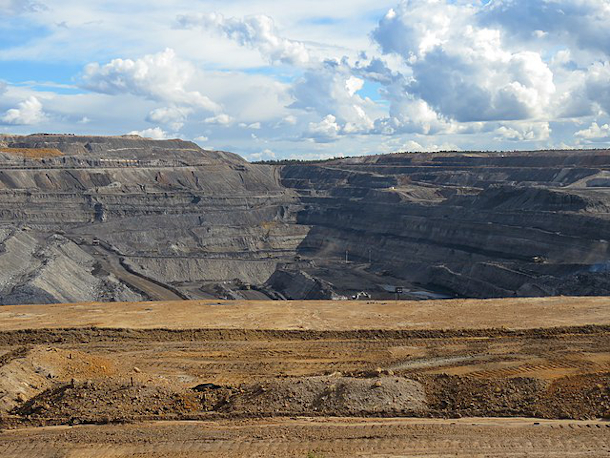
The Premier Coal mine in the Collie coal basin of Australia in April 2022. Australia is the world’s second largest exporter of coal. (Photo: Calistemon, Wikimedia Commons CC BY-SA 4.0)
CURWOOD: Looking at the world, there wasn't a whole lot of progress made at COP26 last year in Glasgow, Scotland, in terms of getting coal phased out. I mean, there was a tiny nod, but it was pretty watered down. Now there's another big climate summit coming in November. It'll be in Egypt. And actually, as we're speaking there's the interim session in Bonn, Germany that is looking at some of these things, to try to get prepared for the fall. Now previously, Australia has been very skeptical at these gatherings and has not wanted to pitch in. What role might Australia now play in helping to steer the global community in the right direction at the UN climate negotiations?
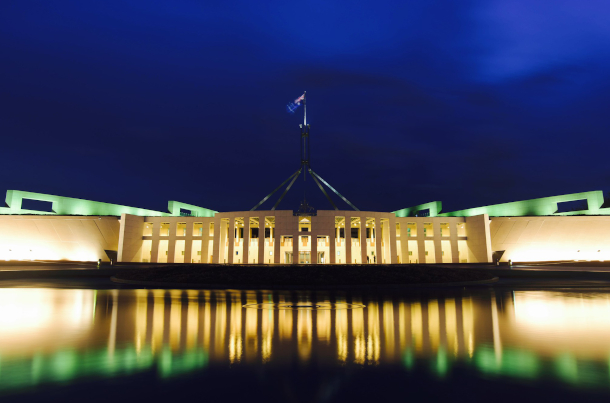
Australian Parliament House in the capital, Canberra (Photo: Jerry Skinner, Flickr CC BY-NC 2.0)
PALESE: It's a great question. I think Australia has the opportunity to come in with a bit of fresh blood and new ideas and excitement, to make a difference, to talk about this transformation, to bring some of these examples of these entrepreneurs who are really shaking things up. And I would argue that COP26 was not as unsuccessful as many people made it out to be. It is putting forward financial mechanisms that are quite difficult to do. They're now into the nitty gritty of how we transform economies, how we transform sectors like transport, industry, etc. This is the hard stuff of climate change. So it's not Paris Agreement statements that are very sweeping and very general. Now we're into the nuts and bolts of how to address climate change. They did make five or six or eight good steps forward of setting up those mechanisms. That's not to be ignored. Now, we have to push that further, of course. But I would say the three things that might make that difference are the security aspect, because climate change is now becoming a major security issue for every country, including an energy security issue with Russia invading the Ukraine. Secondly, I think that excitement about the transformation is real. So if it can bring together those that are excited with the money behind it can push faster. The third thing is the inevitability of extreme weather impacts that we are seeing all over the world, I cannot mention enough, the desperate state of what India and Pakistan just went through, which was shocking to even people like me who follow extreme weather and climate pretty much 24 hours a day. I believe India hit a land temperature of a astonishing 62 degrees Celsius. That is a heat temperature that has never been experienced before on Earth.
CURWOOD: And by the way, 62 degrees centigrade is over 140 degrees Fahrenheit.
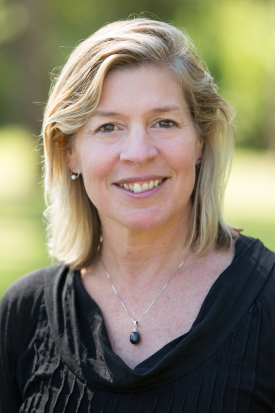
Blair Palese is managing editor of Climate and Capital Media and co founder of 350.org Australia. (Photo: Courtesy of Blair Palese)
PALESE: That's right, that's right. We don't yet know what the death toll was from that heat wave in India and Pakistan. But it will be extreme, and it will be a wake up call to every country in the world, that this is coming to every country, the changes will be dramatic, they will start to interact with each other. We will see impacts on water, we will see impacts on air quality, like we did here in the fires in Australia. So I think it's all before us. I think the opportunities are there. I hope Australia can add some new blood and excitement to that. And I hope we can move it without being held back by the situations that we're seeing; people, for instance, returning like Biden is to, let's go back to our own reserves. We need to push forward renewables. We can do it, we must do it and we have every reason to do it if we want a livable planet.
CURWOOD: Blair Palese is the managing editor of Climate and Capital Media and co founder of 350.org Australia. Blair, thanks so much for taking the time with us today.
PALESE: Thank you, it was a great pleasure.
Related links:
- Blair Palese for Climate and Capital Media | “Meet The Climate Independents Who Shocked Australia’s Political Elite”
- Watch: Al Jazeera | “Australia’s New PM Albanese Backs Climate, Defying Murdoch Media”
- The New Daily | “Labor’s Full Cabinet Has Finally Been Sworn In. Here’s A Who’s Who of New Ministers”
[MUSIC: Mongo Santamaria, “Summertime” on Brazilian Sunset, by George and Ira Gershwin, Artists Only! Records]
DOERING: Coming up – We’ll stay in the land down under with this year’s Goldman Environmental prize winner from Islands and Island Nations. That’s just ahead on Living on Earth.
ANNOUNCER: Support for Living on Earth comes from Sailors for the Sea and Oceana. Helping boaters race clean, sail green and protect the seas they love. More information @sailorsforthesea.org. Support also comes from Friends of Smeagull the Seagull and Smeagull’s Guide to Wildlife. It’s all about the wildlife right next door to you! That’s Smeagull, S - M - E - A - G - U - L - L, SmeagullGuide.org.
[CUTAWAY MUSIC: Mongo Santamaria, “Summertime” on Brazilian Sunset, by George and Ira Gershwin, Artists Only! Records]
Cutting Up Credit Cards to Stop Coal
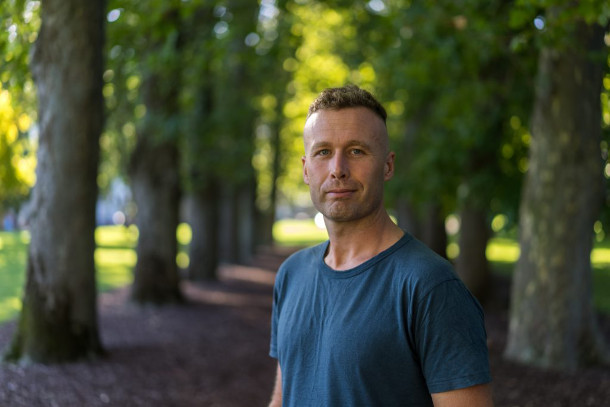
Julien Vincent is the executive director of the Australian organization Market Forces. (Photo: Goldman Environmental Prize)
CURWOOD: It’s Living on Earth, I’m Steve Curwood
DOERING: And I’m Jenni Doering
If you don’t like that your bank lends money to support and expand fossil fuel production, cut up your credit card! That’s the advice of Australian Julien Vincent, winner of the recently announced 2022 Goldman Prize for Islands and Island Nations, It’s awarded annually to outstanding environmental heroes on each of the inhabited continents. Julien is the executive director and lead campaigner of the NGO Market Forces. He organized campaigns and protests that eventually caused four of the largest banks in Australia to commit to ending funding for coal projects by 2030. Also Australia’s major insurance companies will stop underwriting fossil fuel enterprises. Julien Vincent joins me now from Melbourne, Australia. Welcome to Living on Earth!
VINCENT: Thank you so much for having me on the show. It's great.
DOERING: So what sparked your interest, way back, in the environment and environmental protection?
VINCENT: Well, when I went to university, it was with the intention of being a weatherman, basically, I loved weather and climate and wanted to be a meteorologist. And so I went in and started getting lectures, and this is about 20, or so years ago, from scientists who were quite obviously freaked out about the state of the climate. And the issue really didn't have anywhere near the amount of public attention level and acceptance or concern back then. And you can quite clearly convert graphs and charts and tables into phenomenally profound impacts onto the world, onto the state of the biosphere, onto communities. And you could just see that sort of pervasive impacts that would take place if we would allow this to continue and accelerate. And so that put a rocket up me basically. And from that moment on, I was off and running, and just wanted to be part of trying to solve this issue in whatever way possible. And if you can stick around long enough and have a bunch of different experiences, you sort of figure out what activism done well looks like increasingly. And then of course, the other key moments, the pivot in my story is starting to win some campaigns stopping new fossil fuel projects, by going after the money and realizing well, there is a need here for something, a group or some entity that focuses day in day out on the role of finance and investment. Because it is obviously pivotal, but nowhere near as much attention was being paid as it should have been.
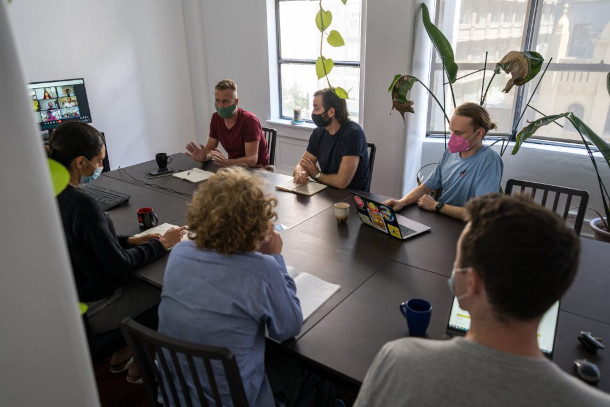
Julien Vincent organized a grassroots campaign that targets Australia’s largest financial institutions and convinces them to stop investing in coal projects. (Photo: Goldman Environmental Prize)
DOERING: Yeah. Tell us more about that. What made you decide to address climate change by targeting the financial backing of the coal industry?
VINCENT: By succeeding on that basis. So I think one of my last campaigns when I was at Greenpeace, I worked there for about six and a half years as a climate and energy campaigner. And we were stopping projects by preventing them from securing finance from our major banks, without which other sources of secondary funding or even government funding would fall over. And the project itself would fall over and essentially disappear. And so that just opened my eyes to the incredible influence and power of financial institutions. I mean, it's quite easy now to look back with hindsight and think, why didn't we see this earlier, because there's so much work being done on banks and other kinds of investors these days. But back then, you know, we were very much focused on grassroots organizing, and local political campaigns and governmental campaigns at a national level, all of which are still very important, arguably more important today than ever before. But there was just this, this gap, that I thought, well, let's just throw myself into working in this space and see where it goes.
DOERING: And by the way, how big of a deal is the coal industry in Australia?
VINCENT: Not as big as the coal industry makes out. It obviously employs in the tens of thousands of jobs, there's actually been polling done that shows there's something like 10 or 20 times more value or more employment perceived by the Australian public from the coal industry as to what it actually provides. So what the coal industry does is a very good job of marketing itself. However, it's obviously better resourced than NGOs. And so it can do flashy marketing, and inflate its image, which is done to great success. Where I would give the coal industry credit, if that's what we want to call it, is it and Australia has a really outsized impact compared to our scale, our population on the global carbon supply chain, and we're certainly one of the biggest coke and coal miners in the world. We're attempting as a nation to rival Qatar to be the biggest exporters of LNG. We're basically pededlers. We're just peddling this dirty fuel around the world. And so that's what our coal industry is, has been able to do. And it will do what companies do, it will get away with as much as what the community allows it to get away with. And what we're trying to do here is point out that, as we've done with our divestment campaigns in Australia, that people don't want their finances associated with activities that contradict their values. And people in Australia and around the world care about acting on climate change. They don't want the custodians of their money, being able to use it to counter their very strongly held values of environmental protection, and avoiding catastrophic climate change. One of the things that we've done and I think it's the responsibility of grassroots groups and NGOs is to help facilitate people to exercise that power really effectively. You know, one of our great tactics in the early days was to organize people to come together en masse and close their accounts with their banks, as little Divestment Days we would call them. And what was great about that was that it didn't matter if you had a million dollars in your account or $10 in your account. The point was that you were being public, you're visible. And essentially, we were starting a conversation about how people in Australia, in this case, didn't want their finances connected with more environmental damage through fossil fuels. This is totally replicable anywhere else.
DOERING: And by the way, with these Divestment Days, there was a very symbolic act that I think you would ask people to do.
VINCENT: I believe you're talking about something involving a credit card and a pair of scissors.
DOERING: Yeah.
VINCENT: Yeah. I mean, that made for great imagery. And I would recommend that to anyone who's contemplating a Divestment Day anywhere else in the world. You know, it was one of those brilliant moments where people just enjoyed doing something that in so many other respects, we're talking about changing bank accounts, it's such a mundane thing to do. But we went and we made it fun. We made it fun, and something that actually exerted power and influence and has contributed to lasting change from these banks, which have since then, not just with the Divestment Days, but a lot of other work too, have now committed to being out of thermal coal by 2030.
DOERING: And by the way, how did you convince the finance executives that they needed to stop funding coal projects?
VINCENT: By building enough power. By having enough people doing what I was describing before, whether it's organizing to delete your account publicly and make some noise about it, or organizing shareholders, to cause a scene at the Annual General Meeting and ask questions of directors that made their life more uncomfortable or challenge them just on their climate credentials. In fact, one of the best avenues for changing companies of all sizes is staff. And no company wants a disenchanted staff base. And we've seen a number of companies shift policies and, and even shift their positions on individual projects as a result of staff organizing, and working really constructively internally, that doesn't even need to be adversarial, to make it clear what their expectations are. So again, it just comes back to building power. On the other side of what we're trying to get done are very wealthy, and powerful, and entrenched fossil fuel companies. And their friends in Parliament around the country. And we need to counter that. And so it's simply a matter of doing and engaging and looking for more ways in which you can tap into the community's power. People power is real, it's useful. Without it we wouldn't have had all of this change, it's simply a matter of people being willing to exert the influence that they have and use the power that they have. And organizations like my own being as effective as we can in making it possible for for that power to be exercised.
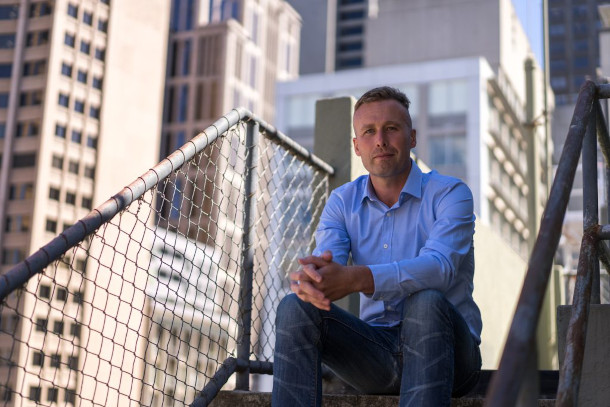
Australia’s largest banks and insurers have committed to stop funding coal projects by 2030. (Photo: Goldman Environmental Prize)
DOERING: So, you've been able to secure some really pretty strong commitments from Australia's largest banks and major insurers. Tell us about what they've said they'll do.
VINCENT: Well, all of our big four banks, they're the ones that do just about all of the lending to the fossil fuel sector. And they've all committed to have their exposure to coal trend down to zero by 2030. So that's just means that between now and 2030, the degree to which they'd be exposed to the coal sector will diminish and diminish and diminish and ultimately, tail out to zero by 2030, which is good, because that's one of the many things that we need to get done to meet the goals of the Paris Agreement. It's not everything, but it's one thing that we can tick off the list. And probably even more importantly, our insurance industry. So we've got three big insurers, including QVE, which is also present in the US. They've also committed to be out of thermal coal by 2030 or sooner and not insure new projects. In fact, one of our insurers, Suncorp, not to be confused with Suncor the oil company in North America, that insurer has committed to no longer insure new upstream oil and gas projects and also phase out its oil and gas exposure by 2040, which I believe was the first in the world to do that. So now, it's a question of how quickly can we expand this out to no expansion of any fossil fuels and start managing down and replacing this global coal oil and gas sector with clean renewables?
DOERING: Julien Vincent is the recipient for Islands and Island Nations of the 2022 Goldman Environmental Prize. Julien, thank you so much for joining us today.
VINCENT: Oh, thank you. It's a real pleasure.
DOERING: This was the second of six stories featuring this year’s Goldman Prize winners. Tune in to Living on Earth over the weeks ahead for the rest.
Related links:
- Watch: Julien Vincent’s Acceptance Speech for the 2022 Goldman Environmental Prize
- Watch: Julien Vincent's story
- Goldman Environmental Prize: Meet the Winners
- Listen to our conversation with 2022 Goldman Prize winner for Africa, Chima Williams
[MUSIC: Sharasen, “Australia-Road-Trip” on Australia-Road-Trip, Sharasen]
Join us for a Juneteenth Celebration!
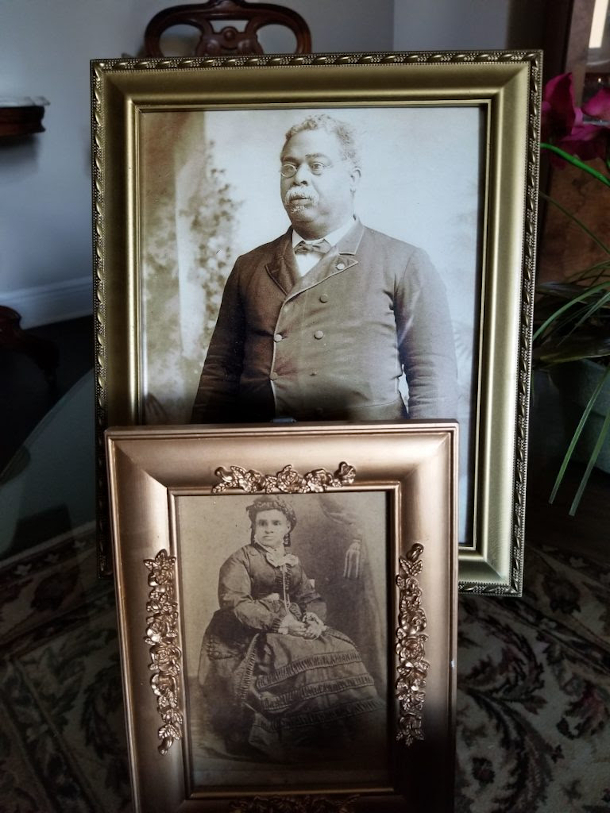
Robert and Hannah Smalls. Photo courtesy of Michael Boulware Moore
DOERING: Join Living on Earth and our partners for a special Juneteenth celebration on Monday, June 20th at 6:30 p.m. Eastern. We’ll hear the incredible story of Robert Smalls, an intrepid Black man who took command of a Confederate ship called The Planter in Charleston, South Carolina and liberated himself and his family from enslavement 160 years ago on May 13th, 1862.
CURWOOD: So don’t miss our free, live streamed Juneteenth celebration of “Black Courage Upon the Sea”. Sign up at loe.org/events.
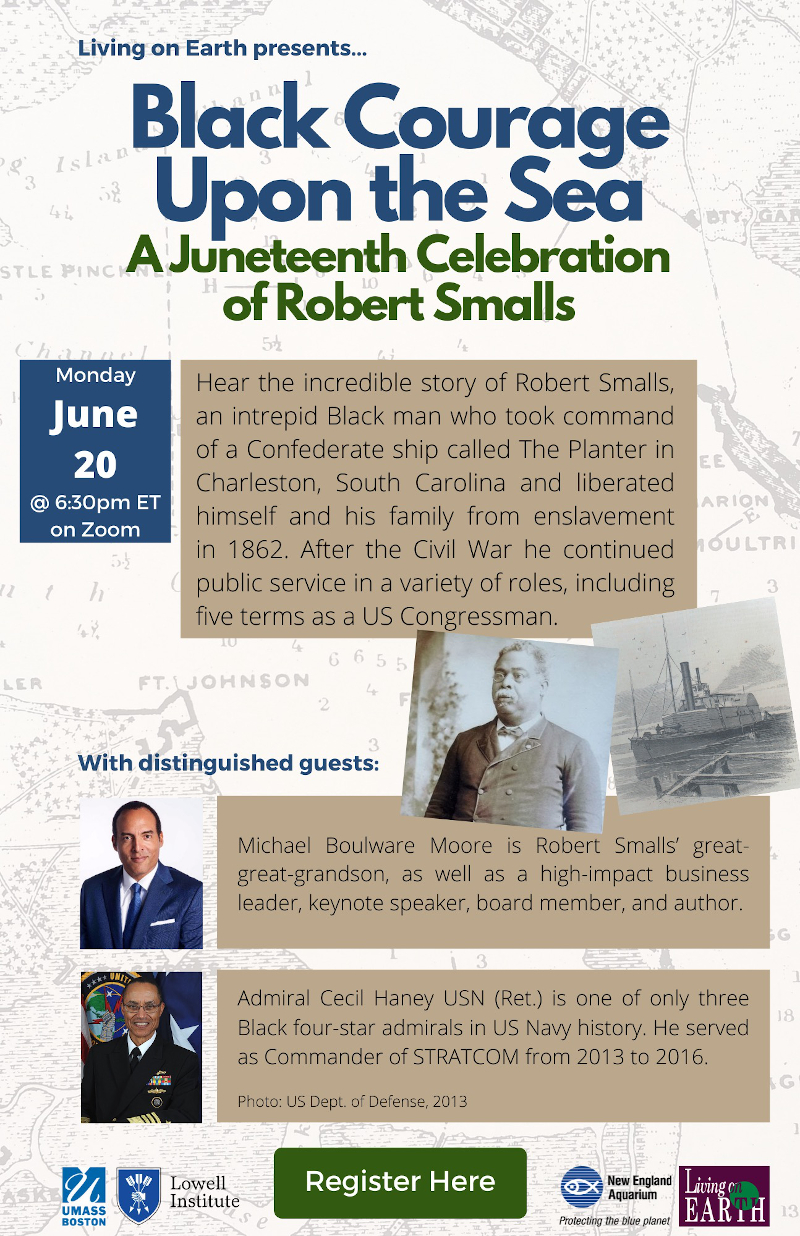
Related link:
Sign up here at loe.org/events
[MUSIC: Sharasen, “Australia-Road-Trip” on Australia-Road-Trip, Sharasen]
Taking the A Train to a National Park
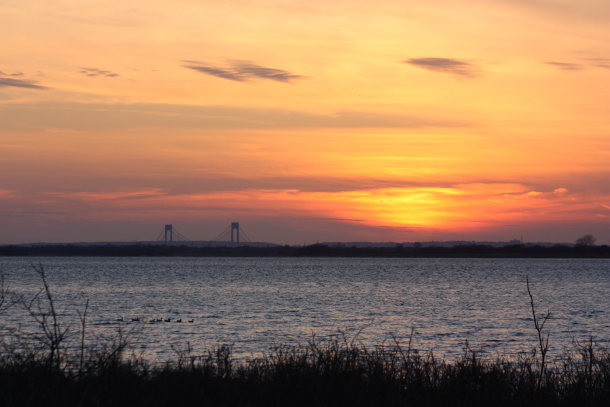
Jamaica Bay Wildlife Refuge in Gateway National Recreation Area. (Photo: Peter Roan, Flickr, CC BY-NC 2.0)
CURWOOD: It’s that time of year when some people start hitting the road to the US National Parks for fun, sun and the blessings of nature. But in many places including New York City you don’t need to have a car and buy pricey gas to be in nature, as transit fare is enough. Gateway National Recreation Area spans across three boroughs of New York City and stretches out to Monmouth County, New Jersey. Since 1972, this land, managed by the National Park Service, has offered green spaces, beaches and recreational opportunities to residents of the nearby urban jungle. So, there’s the Jamaica Bay Wildlife Refuge in Brooklyn and Queens, Great Kills Park on Staten Island with swimming, boating, and hiking, and Sandy Hook with seven beaches on the New Jersey side. Don Riepe has been the Jamaica Bay Guardian since 2004 and he says one choice to get to the Bay on transit is to take….
RIEPE: The A train or you can even take the Q 53 bus to Rockaway and get off right at the entrance area. Another way to get here from Manhattan is to take the ferry from Wall Street to Rockaway at 108th Street, and that's right on the edge of the bay. And from there, you can take a short bus ride to the Refuge Visitor Center.
CURWOOD: Don, you can tell me what's your favorite part of the Gateway National Recreation Area, where if you really want to impress people as to how wonderful it is to have this National Park Service area right within reach of Brooklyn and Queens and Manhattan and Staten Island and the Jersey Shore. What's your favorite spot to show people where we're talking about?
RIEPE: Well, of course, it's the Jamaica Bay Wildlife Refuge. I lead tours there every month. In fact, this Saturday we're having a Horseshoe Crab Festival at 11 o'clock, and we do invite families, especially with children to come. It's a great event.
CURWOOD: I understand that along the beaches there this time of year, you're likely to run into horseshoe crabs.
RIEPE: Correct. Especially during the new moon or the full moon. Thousands of horseshoe crabs come ashore, as they've been doing for hundreds of thousands of years to lay their eggs. The big females come ashore and they burrow down just outside of the high tide area. And they lay big clutches of little greenish blue eggs and attending them are males. When she lays the eggs she gives off a pheromone, like a perfume, that stimulates the males to deposit sperm and fertilize them. We can pick up the crabs, we can show, turn them over and show the kids that they're harmless, show the difference between the male and the female and then we talk about their ecological and medical value. They have great medical value as well, because they're bluish copper based blood has a clotting factor in it that will clot when exposed to minute traces of pathogens, more sensitive than any instrument we have. And if you're getting a vaccination or a blood transfusion, you want it to be pure. They test it with that element from the horseshoe crab. So, who knew right?

Several public transportation options will bring you to Gateway National Recreation Area, including the A Train. (Photo: MTAEnthusiast10, Wikimedia Commons, CC BY-SA 4.0)
CURWOOD: Who knew? I mean, those creatures date back literally millions of years.
RIEPE: Yes, some people say as much as 400 million years back in the fossil records. They predate the dinosaurs actually.
CURWOOD: So, what am I going to see when I get there? What, if it's a National Recreation Area, how am I going to have recreation?
RIEPE: Well there are two ponds on either side of Cross Bay Boulevard. One is about 45 acres and the other is over 100 acres. And there's trails around them. And you'll see lots of waterbirds: egrets, herons, ibis, shorebirds, terns, all the birds of Jamaica Bay.
CURWOOD: An important neighbor of Gateway National Recreation Area is a major airport.
RIEPE: Correct.
CURWOOD: The Kennedy Airport.
RIEPE: Exactly.
CURWOOD: So some might say that there are a lot of metal birds as well as those with feathers.
RIEPE: Correct.
CURWOOD: So, how do you get the two to coexist?
RIEPE: It's not easy. So, at the airport, the U.S. Department of Agriculture has biologists that patrol the runway, and they will scare off any birds that are on the runway. If a pilot is taking off, and he sees something on the runway he calls it in and they do a, you know, patrol and they scare anything away. But they also have a shooting program. So they have permits from both the Fish and Wildlife Service and the New York State DEC to shoot any offending gulls or geese or whatever that come across airspace that they feel is a threat to aircraft.

Lucky visitors can spot horseshoe crabs on the beaches of Gateway. (Photo: Steve Curwood)
CURWOOD: What kind of creatures are in the water?
RIEPE: So we have over 100 species of finfish that have been identified in the bay. A lot of them are fish that people know that we eat like striped bass and black fish and blue fish and flounders and so on.
CURWOOD: So wait, can I take a rod and reel and go out and try to catch something?
RIEPE: Sure, fishing is allowed. A shout out to the New York City Department of Environmental Protection for upgrading the treatment plants. So that also made the water cleaner here.
CURWOOD: In other words, if you fall in, you don't have to quickly run and take a shower.
RIEPE: Not quickly, but eventually. And you know, you can just go offshore, you can take a boat out of Sheepshead Bay and see whales right off our coast here now, something you couldn't do 30 years ago. And I see seals in Jamaica Bay now in the winter and dolphins as well. So not only the waters are cleaner, but there's a lot more fish in the water that attract these large mammals.
CURWOOD: Now what about you know, a beach where you could put out a towel and go for a splash?
RIEPE: Yes, that would be at Riis Park. So Riis Park is also just over the Marine Park Bridge on the Rockaway side. And it's near the communities of Neponsit and Breezy Point. And those big beautiful beaches are open year round for people for recreation. And if you're in Brooklyn and Queens, you can go to different areas around Jamaica Bay like Plumb Beach, or Canarsie Pier if you want to fish, or Jamaica Bay Refuge if you want some passive recreation and birding and just enjoying the great views that we have here.
CURWOOD: Don, before you go tell me how important it is to have a National Recreation Area right within a subway or bus ride or boat ride of a major city like New York.
RIEPE: Well, you think of 8 million people broiling today in the city with all this heat looking for some outlet, and certainly going to the water is one of the best ways. So getting out to one of the local beaches or parks around there. You know, New York City Parks has a pretty good park system as well, as does Gateway. There are many different aspects to Gateway. If you're on Staten Island, there's Miller Field, which is a kind of big recreational field, and Great Kills Harbor. If you're in Sandy Hook, there's Sandy Hook National Seashore. So, these are all old military bases. So, they have historic value as well.
CURWOOD: And affordable, not necessarily places along say Central Park or Prospect Park, where the rents are a little higher these days.
RIEPE: Correct. And the mission of the Park Service, why they created Gateway, was to bring the parks to the people. For people that couldn't afford to go to Yellowstone or Yosemite or the Grand Canyon, at least they have a local place they can go and have the park experience as well.
CURWOOD: Don Riepe is the Jamaica Bay Guardian speaking to us about the Gateway National Recreation Area there in the New York New Jersey area. Thanks so much, Don for taking the time.
RIEPE: Thank you, it was fun.
Related link:
Learn more about Gateway National Recreation Area
[MUSIC: Duke Ellington, Count Basie “Take the “A” Train” on First Time! The Count Meets The Duke, Columbia Records]
DOERING: Coming up – We’ll have some tips to make gardening more affordable and maybe even save some green on groceries during this time of inflation. That’s just ahead on Living on Earth.
ANNOUNCER: Funding for Living on Earth comes from you, our listeners, and United Technologies, combining passion for science with engineering to create solutions designed for sustainability in aerospace, building industries, and food refrigeration.
[CUTAWAY MUSIC: Duke Ellington, Count Basie “Take the “A” Train” on First Time! The Count Meets The Duke, Columbia Records]
Beyond the Headlines
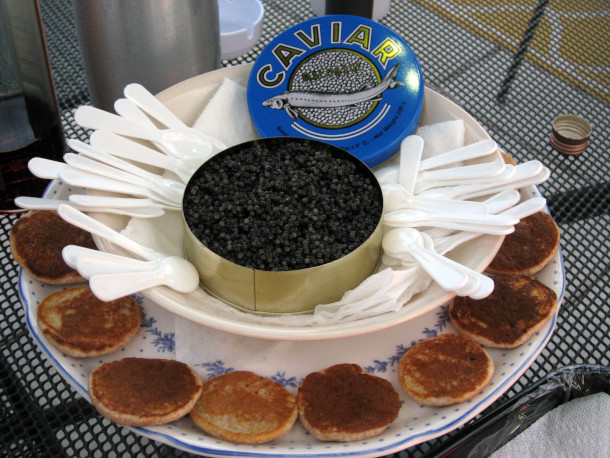
The US Fish and Wildlife Service is proposing placing four species of sturgeon on the Endangered Species list. Sturgeon, which are present in the Caspian Sea as well as other large river systems in Europe such as the Danube, produce coveted caviar, or fish eggs. (Photo: Veronica, Flickr, CC BY-NC 2.0)
CURWOOD: It’s Living on Earth, I’m Steve Curwood.
DOERING: And I'm Jenni Doering.
It's time now to take a look beyond the headlines with Peter Dykstra. Peter's an editor with environmental health news. That's ehn.org and dailyclimate.org. And he's on the line from Atlanta, Georgia. Hey, Peter, how's it going this week?
DYKSTRA: Oh, hi, Jenni. There's some news coming out of the Caspian Sea region, what's lately been a strife-filled region of the world. But the US Fish and Wildlife Service is looking at potentially slapping an endangered listing on four different species of caviar-bearing sturgeon. They're anadromous fish. They live much of their lives in saltwater, part of their lives when they spawn in freshwater, big European rivers like the Danube system and others. A lot of the sturgeon in the Black Sea have already been wiped out. The Caspian Sea has been the center of the caviar business.
DOERING: Peter, that region's been in the headlines a lot recently with Russia's invasion of Ukraine. How does that bode for these sturgeon that are potentially endangered?
DYKSTRA: It's tempting to think of sturgeon as being a political tool in this major crisis. That is probably not the case because the Russians are not the only ones that harvest sturgeon for caviar or for meat. All of the countries that surround the Caspian Sea are in the sturgeon business. This is an effort to at least identify and remind the world that caviar and the sturgeon they come from are still under extreme stress.
DOERING: What else do you have for us this week?
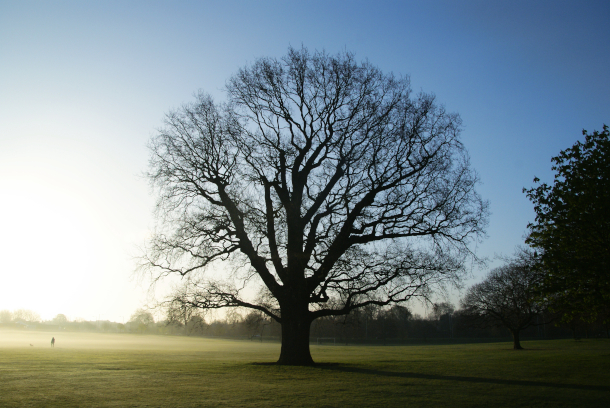
Hazel Henderson famously challenged the status quo in the field of economics, arguing that we should move beyond profit maximization and consider the environmental and social costs of our actions. (Photo: Martin Sveden, Flickr, CC BY 2.0)
DYKSTRA: We've got an item from the obituary column, unfortunately. A great, great environmental thinker, and environmental economist, you don't hear that too often. But Hazel Henderson, made the mold and also for most economists, broke the mold, looking at the "dismal science" in a way that's a lot less dismal. She wanted to make sure that in dealing with economics, we didn't just look at the bottom line and the profitability for companies. But we looked on how they affected the quality of life for all of us. She taught her followers to think globally, and act locally. She didn't coin that phrase, but it was the theme of her life's work. And she certainly helped popularize that phrase.
DOERING: Yeah, well, I have to say, I hadn't actually heard of Hazel Henderson before. But sounds like she was one of those unsung heroes of the environmental movement.
DYKSTRA: She is, and she'll probably be more respected and widely read in death than she was in life. But she really left a mark on a part of environmental science and politics, that so many of us pay very, very little attention to.
DOERING: So think globally, act locally. I'll think of Hazel The next time I hear that phrase. Hey, Peter, what do you have from the history vaults this week?
DYKSTRA: June 3, 1992, the Rio Earth Summit, the United Nations Conference on Environment and Development, opened in Rio de Janeiro, Brazil. The delegates there from around the world agreed on several things, a statement on forest principles, the United Nations Convention on Biological Diversity, and it also set up the UN Framework Convention on Climate Change. That's something that's led to a series of meetings over 30 years. The question remains, 30 years down the line, how much progress have we really made?
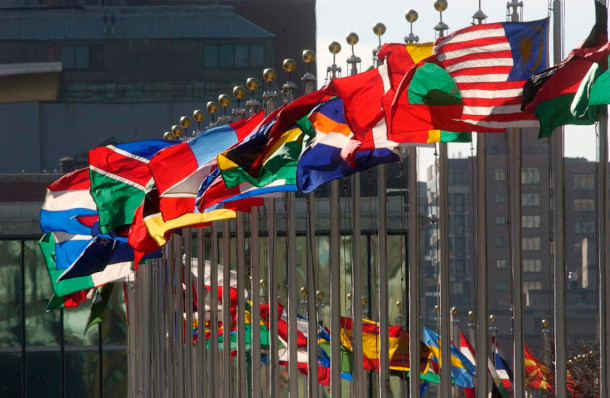
Annual Conference of the Parties (COP) meetings were born out of the Rio Earth Summit in Rio de Janeiro, Brazil, which took place thirty years ago this month. (Photo: United Nations Photo, Flickr)
DOERING: It's a really good question, Peter. Here in 2022, we really don't have 30 more years to mess around with far-off plans for solving climate change and the biodiversity crisis.
DYKSTRA: That's right. The solutions are in short supply. The urgency is huge. And we're still talking a better game than we're actually doing, thirty years after Rio.
DOERING: Thanks as always, Peter. Peter Dykstra is an editor with Environmental Health News. That's ehn.org and daily climate.org. We'll talk to you next time, Peter.
DYKSTRA: All right, Jenni, thanks a lot, and we'll talk to you soon.
DOERING: And there's more on the stories on the Living on Earth website. That's loe.org.
Related links:
- E&E News | “Feds Propose Listing Russian Sturgeon, A Fish Now In A War Zone”
- The New York Times | “Hazel Henderson, Groundbreaking Environmentalist, Dies at 89”
- United Nations | “United Nations Conference on Environment and Development, Rio de Janeiro, Brazil, 3-14 June 1992”
[MUSIC: Pepe Barcellos, “Anhanga” on Lendas Do Nosso Brasil, by Pepe Barcellos, Tex Studio De Danca]
Gardening on a Budget
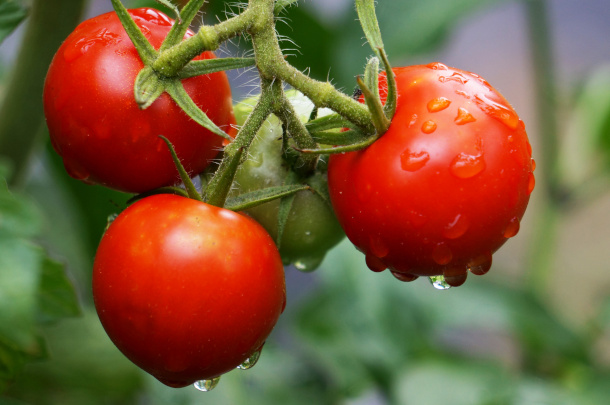
Tomatoes are known for adding flavor to any dish and for being the vegetable that keeps on giving. They grow best in fertile soil and good sunny sheltered spots. (Photo: j_arlecchicno, Flickr, CC BY NC 2.0)
CURWOOD: Inflation is now driving up prices for many products including food. Healthy organic food already came with a premium, so growing it yourself can be a way to access quality produce at affordable prices. Some up-front investment is required, but our gardening guru Michael Weishan has tips on how to save some green with your green thumb. Michael is also the former host of the Victory Garden on PBS and spoke with Living on Earth’s resident gardener Bobby Bascomb.
WEISHAN: I am delighted to be back.
BASCOMB: What are you thinking about this year as you're starting to plant your garden and trying to be frugal about it?
WEISHAN: You know, the costs are going up everywhere. I mean, it's not only in food but it's in gasoline and oil especially in electricity. And you've got to remember that gardening is very energy intensive, you would think it's not because you would think it's green, right? I mean, you know, we're out there in the garden in the sun in the soil. But the reality is it's highly petroleum based. I mean, the fact of the matter is all the plants that you buy are started in greenhouses that are heated generally by gas or electricity. They're put in plastic pots, which are made from petroleum, they're then shipped to your nursery which uses petroleum. They're then heated there which uses you know, energy, and it goes on and on right, even down to the fertilizer you apply in your garden. So, you know, one of the best ways to talk about saving money in the garden and also saving the environment is growing your own seeds. I have been very active this spring both in growing vegetable starters, which have skyrocket in price. I don't know if you've seen them at the nursery, but it's just, you know, you're talking $2.99, $3.99 a pack of four little vegetables. And if you think about it, that's four seeds. And a pack of seeds is two bucks, so you can do the math.
BASCOMB: Now, what about soil, you know, a good bag of gardening soil is going to run you around 10 bucks or so and you're going to need a lot of them depending on how big you want to make a garden if you're starting a new garden this year. That is, do you have any tips on how to come by some more affordable soil for a garden?
WEISHAN: Compost, compost piles is your best friend. Soil has gotten crazy bonkers expensive, obviously, because it's heavy and it requires a lot of transport, which is of course is expensive. In this particular case, the easiest way to get around this is to have your own compost pile. And there's a trick to compost and it's easy but it's not. And if you don't follow the trick, the whole thing fails. And here's the trick.
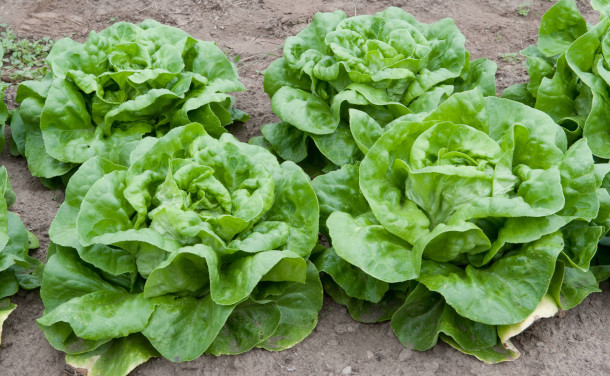
Lettuce is a wonderful vegetable to incorporate into your garden because it regrows once its leaves have been cut or picked off the main stem. (Photo: Dwight Sipler, Flickr, CC BY 2.0)
BASCOMB: Okay.
WEISHAN: It needs to be turned, which means you need to take the bottom of the pile to the top and the top of the pile to the bottom. If you just let it sit of its own volition it's going to take years and years to fully rot down to the point where you can really use it. If you turn it, it's ready in three to four months. So, and you think why would you want to do that it like sounds like a lot of work. But you get this incredible content of soil, which then you can do anything with, you can add grit to, to make cactus mix, you can add vermiculite or perlite to make a perfect potting mix for any type of indoor plant. You can put it directly onto your garden, you can use it as mulch, which is what the English do, they don't do our whole bark business. And you know, I have ducks and geese here so we put the bedding in the shavings and the and the debris. And it makes incredible soil very quickly, but you have to turn it. And I must admit I don't turn in any more myself. I hire a kid. I hire two kids from high school, it takes them about two hours, they go out there with pitchforks, they go, boom, boom, boom, boom, and it's done. Otherwise, I'd be going one, two. [LAUGH] You know, as you're getting older you have to be realistic about some of these efforts you can make.
BASCOMB: The cost savings might be, you know, offset by the Advil you have to be taking the next day after something like that.
WEISHAN: Yeah, although I will say in terms of like incredible potting soil for inside for the greenhouse, you couldn't buy it.
BASCOMB: Yeah, you know, another thing I've been thinking about, just in terms of compost and augmenting your soil is, you know, I live near a ton of horse farms and goat farms and all sorts of things like that. I mean, I wonder, have you ever approached some farming neighbors and said, hey, you know what or maybe hire those high school kids to, you know, take away some manure and improve the soil that way? I mean, I bet that'd be an option for some people.
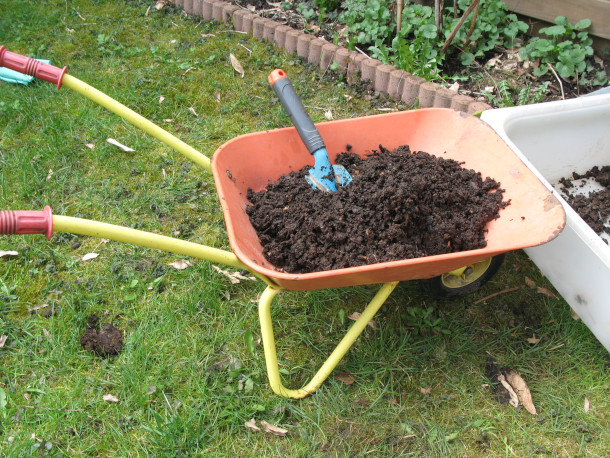
Compost after sifting, which aerates the compost, improving the soil structure of your garden beds. Compost can be made in as little as 6 to 8 weeks. (Photo: Susana Secretariat, Flickr, CC BY 2.0)
WEISHAN: Oh, yeah, absolutely. I kept horses here for a long time so I had my own manure sources. But you can go look to your local bridle stable, for instance, and they have a ton of manure that they're just always praying to get away. So you can, if you go have a pickup or a friend who does or some means of conveyance. Sometimes they'll even deliver a load to you because they just really want to get rid of it. Then you put it in a big pile and then you spread it out in the garden. Now, cow manure is the best because it doesn't have seeds, weed seeds in it, horse manure, their digestive process isn't as good so it still has weed seeds. And frankly, I don't care because the incredible benefit it gives to the soil is phenomenal. One thing I will say just be real careful with chicken manure, which is also a very good fertilizer, but that is the one that cannot be applied directly to the garden. It's too hot. It needs to go onto a dormant garden. It can go over winter, or into the compost pile, but not ever directly applied and dug in like you can with horse manure or cow manure.
BASCOMB: Well you know, speaking of chickens, you and I both have chickens, we have a flock of about six here. And I think they're great, you know, we feed them our kitchen scraps and maybe some store about food and they give us eggs and fertilizer. What's not to love about chickens?
I don't know and frankly, if you've seen the price of a dozen eggs recently, you'll really appreciate these little girls and all the work that they do on your behalf. [QUAKING] As a matter of fact, you may be hearing one of my chickens or ducks out there. Even as as we're speaking. I really would urge everyone to go into the chicken biz, even if it's a couple of hens. They are wonderful things to have around the garden, they eat every single bit of debris, they eat every bug, you could possibly ticks, roaches, spiders. I mean, you name it, if it moves, they eat it. They also eat all your kitchen scraps, which is one of the reasons I sometimes my compost is a little slow, because I don't have any kitchen scraps to put out in the compost pile. Because the chickens eat it all. And they refine it into these fantastic eggs, which you know, you know, if you have your own eggs, they're not anything like store bought eggs. They have a much more golden colored yolk, they whip up easily, you can make egg whites practically by hand. And they're just fantastic for every possible of possible use.
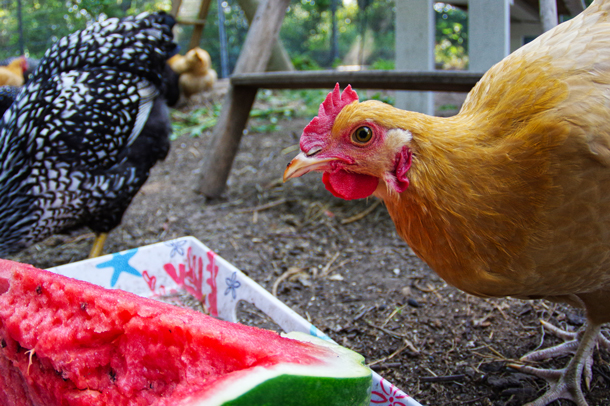
If you have the space, chickens can be a great addition to your garden. They are known to enjoy eating berries, mealworms, and watermelon. (Photo: Art by Heather, Flickr, CC BY-NC-ND 2.0)
BASCOMB: So true. Now, what do you think might be, you know, for somebody that's listening to us and has a little bit of spare cash wants to start something. What's the the easiest thing to get started with and maybe the most cost effective? What's the best bang for your buck? You know, one zucchini plants gonna give us zucchini for the rest of the summer, maybe the rest of your life. But what do you think he meant in that sense?
WEISHAN: You know, a while back, there was a book and I'm paraphrasing the title was my sixty-dollar tomato?
BASCOMB: Sixty-four dollar tomato, yeah. [LAUGH]
WEISHAN: Sixty-four dollar tomato, there you go. If you look at the cost of starting a garden, it's high. Because you have to clear the soil, you have to dig it or have it dug for you. You then have to buy the plants or start the seeds. So you're looking at a multi-hundred dollar investment easily. And then you know people buy the tomato cages and the fertilizer and the little labels and the little fencing that goes around it. So by the time you're all said and done you in the big box stores are are married to about 200 bucks, at least. One of the greatest ways to start if you just want to start to try to do something is to grow greens in pots. I'm growing a whole crop of Bibb, various types of Bibb and small head lettuces, one called tennis ball in a trough outside my back door. And these cut and come again lettuces, they're fantastic. You can make salads off them, and you can cut them and eat them and cut them and eat them and cut them and eat them. The way to make a garden cost effective is very simple. Keep gardening, because the startup costs are what they are, they're fixed. So if you try it and then stop, I mean, essentially you do have the sixty-four dollar tomato. But if these costs are amortized over five years, 10 years, 15 years, then you have the fifteen cent tomato. And the pleasure of having produce that you've grown yourself and the sense of satisfaction and the fact that you can't buy a lot of this produce because it's not shippable it's so damageable, it's so tender often that these varieties don't ship, so you have these incredible meals. I mean, there's a thousand good things about it. But again, it goes back to you know what we've been talking about all the way along, which is this sort of realistic self awareness of gardeners. What are you actually going to do? How much time do you have to do it? How much space do you have to do it in? And do you have the right site to do it in? So, again, being realistic about what you have and what you can potentially produce will be a much more cost effective proposition.
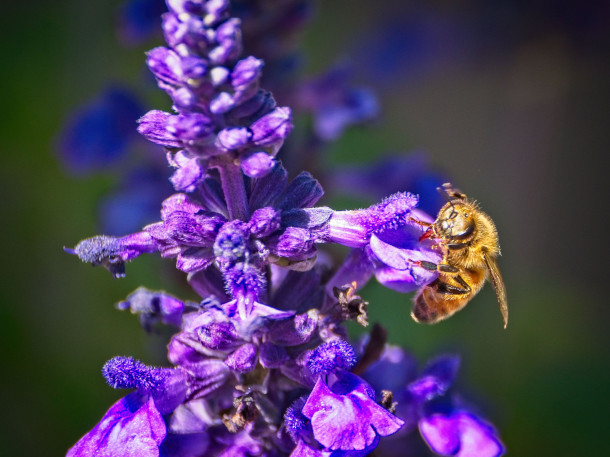
Salvia is in the family of perennials, plants that live more than two years. Salvia is a drought tolerant plant and pollinators such as honeybees love them. (Photo: Jim & Robin, Flickr, CC BY NC 2.0)
BASCOMB: Well, Michael, I really appreciate your time today. You've given us lots of ideas here to avoid that sixty four dollar tomato. So thank you, and maybe we'll talk with you again later this summer.
WEISHAN: Oh, that would be great. Maybe we can do a year end review and see what worked and what didn't and whether I succeeded in not growing the sixty four dollar tomato.
BASCOMB: Oh, you're a pro. I'm sure you won’t.
WEISHAN: Oh, you never know. It's easier to fail than to succeed sometimes. So I just I just will keep my prayers to the garden gods that all goes well.
BASCOMB: That’s Living on Earth’s Bobby Bascomb speaking with our gardening guru and former host of the Victory Gardens on PBS Michael Weishan.
Related links:
- Learn more about Michael Weishan
- Learn more tips and tricks on frugal gardening
[MUSIC: Rick Braun, “Green Tomatoes” on Esperanto, Warner Records Inc.]
CURWOOD: Living on Earth is produced by the World Media Foundation.
Our crew includes Naomi Arenberg, Bobby Bascomb, Paloma Beltran, Chloe Chen, Iris Chen, Josh Croom, Delaney Dryfoos, Mark Kausch, Mark Seth Lender, Don Lyman, Louis Mallison, Aynsley O’Neill, Sophia Pandelidis, Jake Rego, Teresa Shi, and Jolanda Omari.
DOERING: Tom Tiger engineered our show. Alison Lirish Dean composed our themes. You can hear us anytime at L-O-E dot org, Apple Podcasts and Google Podcasts, and like us, please, on our Facebook page - Living on Earth. We tweet from @livingonearth. And find us on Instagram at livingonearthradio. I’m Jenni Doering
CURWOOD: And I’m Steve Curwood. Thanks for listening!
ANNOUNCER: Funding for Living on Earth comes from you, our listeners, and from the University of Massachusetts, Boston, in association with its School for the Environment, developing the next generation of environmental leaders. And from the Grantham Foundation for the protection of the environment, supporting strategic communications and collaboration in solving the world’s most pressing environmental problems.
ANNOUNCER 2: PRX.
Living on Earth wants to hear from you!
Living on Earth
62 Calef Highway, Suite 212
Lee, NH 03861
Telephone: 617-287-4121
E-mail: comments@loe.org
Newsletter [Click here]
Donate to Living on Earth!
Living on Earth is an independent media program and relies entirely on contributions from listeners and institutions supporting public service. Please donate now to preserve an independent environmental voice.
NewsletterLiving on Earth offers a weekly delivery of the show's rundown to your mailbox. Sign up for our newsletter today!
 Sailors For The Sea: Be the change you want to sea.
Sailors For The Sea: Be the change you want to sea.
 The Grantham Foundation for the Protection of the Environment: Committed to protecting and improving the health of the global environment.
The Grantham Foundation for the Protection of the Environment: Committed to protecting and improving the health of the global environment.
 Contribute to Living on Earth and receive, as our gift to you, an archival print of one of Mark Seth Lender's extraordinary wildlife photographs. Follow the link to see Mark's current collection of photographs.
Contribute to Living on Earth and receive, as our gift to you, an archival print of one of Mark Seth Lender's extraordinary wildlife photographs. Follow the link to see Mark's current collection of photographs.
 Buy a signed copy of Mark Seth Lender's book Smeagull the Seagull & support Living on Earth
Buy a signed copy of Mark Seth Lender's book Smeagull the Seagull & support Living on Earth

